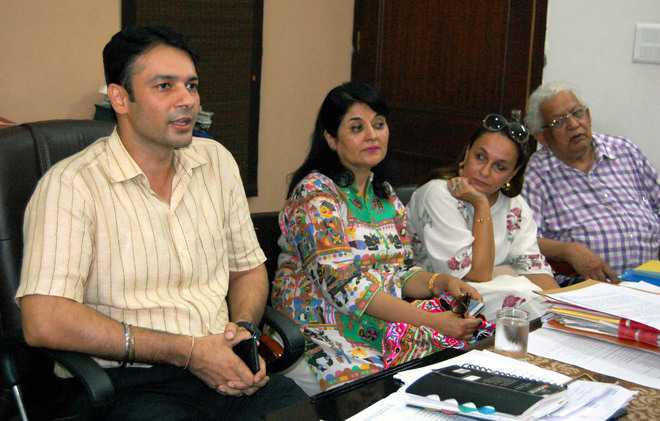Neeraj Bagga
Tribune News Service
Amritsar, July 21
The UK-based economist, Lord Meghnad Desai, adviser to The Arts and Cultural Heritage Trust (TAACHT), which was allotted the work of setting up a museum at colonial structure of the Town Hall, said assistance for collecting the Partition-related material could be taken from Pakistan.
Talking to the Amritsar Tribune he said the Partition of the country resulting in death of lakhs of innocent and migration of crores of people was a shared grief of India and Pakistan.
Desai added that he visited Pakistan nearly ten times. He said he had many friends of Pakistani origin living in the UK. Their help could be taken for collecting Partition-related material, he added. He said some people in Pakistan were also making efforts to set up a similar museum there.
“There is a need to accelerate the pace of securing memories of those people, who migrated to another country, as they are passing away inti oblivion,” he added. He recalled that there was a person, who drew 300 sketches of migrants, staying in refugee camps in Delhi.
Lord Desai is keen to set up an international education base at the museum. The London School of Economics, South Asia Centre, has joined as a full-fledged partner, while other universities abroad and in India are sharing their archives and oral histories for the task. Universities in Punjab are also being approached in order to use their expertise. The museum will become a centre for study of the Partition of India.
“Our ambition is to make the museum a place not only for tourists, but scholars as well, where they can learn about the Partition of Punjab, and of course Bengal. This narrative will mostly be about Punjab because of its location,” said Lord Desai.
While elaborating, he said the template of the Partition Museum could be used to set up similar archives in Bengal and perhaps in the UK at a later stage.
The museum will be a space for memory, healing and reconciliation. It will also memorialize the grit, courage and spirit of the generation, which faced all circumstances of the Partition.
Lord Desai’s wife Kishwar Desai, whose parents migrated from Lahore during the Partition, said the museum would be set up very soon. She said it would be the first museum of its kind in the world. She is the chair of the trust.
“People do not realise that there are many different narratives of the Partition. It has really affected Punjab in so many different ways. Only after coming here the people will understand the great sacrifice the Punjabis and Bengalis made for independence,” said Kishwar.
Actress Soni Bhatt said 50 per cent of Rs 10 crore had been pledged by donors. She said the team from the museum also appealed to the Partition survivors and their families to come forward and contribute their stories and any personal memorabilia from the time. This would reinforce the Punjabi narrative of the museum as it was already collecting varied and interesting objects, which range from coins of that period to personal letters written from refugee camps, she added.
She said oral histories were also being recorded. The museum board had appealed to all families affected by the Partition to share their stories, she added. The board of the Partition Museum has requested grandchildren to record the story of their grandparents on a camera and send it to the museum archives.
Deputy Commissioner Varun Roojam said, “The Tribune newspaper, British Library, the UK Parliamentary Library, the National Archives, Punjab Archives, Punjab Digital Library, Cambridge University, London School of Economics, Southampton University and Amity University are associating them with the Partition Museum.”
Unlock Exclusive Insights with The Tribune Premium
Take your experience further with Premium access.
Thought-provoking Opinions, Expert Analysis, In-depth Insights and other Member Only Benefits
Already a Member? Sign In Now










